
Information and examination of the requirements for the President of the United States
- Subject:
- Social Science
- Material Type:
- Reading
- Provider:
- Library of Congress
- Date Added:
- 07/22/2024

Information and examination of the requirements for the President of the United States
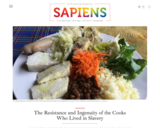
Archaeologists are investigating foodways and re-creating meals prepared by enslaved people who lived in North America and the Caribbean to better understand their everyday lives and fill gaps in the historical record.

This lesson plan and case study can be used to follow the previous one, or can stand alone. They allow students to explore the effects of the Boston busing crisis that occurred during the Civil Rights Movement. Full lesson plan with primary resources included. Encourages critical thinking.
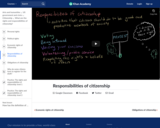
An overview of Responsibilities of citizenship. Created by Kimberly Kutz.

In this lesson, students learn about responsibility and apply the concept to segments of the U.S. Constitution.

Since 2005, the "Past and Present" podcast from Colonial Williamsburg has taken you behind the scenes to meet interpreters, chefs, tradesmen, musicians, historians, curators, and more. We offer two versions of our podcast: one that's audio-only and one that includes a slideshow. In this episode: Each year, Colonial Williamsburg hosts Return of the Cherokee. This special event draws hundreds to observe Cherokee culture as it was in the 18th century when members would come to Williamsburg for trade, diplomacy, or even education. Buck Woodard with Colonial Williamsburg’s American Indian Initiative joins to explain some of the exciting updates to this year’s event.
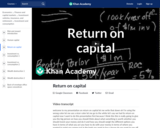
Introduction to return on capital and cost of capital. Using these concepts to decide where to invest. Created by Sal Khan.
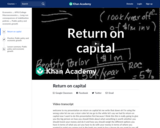
Introduction to return on capital and cost of capital. Using these concepts to decide where to invest. Created by Sal Khan.
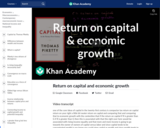
Return on capital and economic growth. A discussion with Sal Khan.

In this oral history from the Birmingham Civil Rights Institute, Frank Dukes describes his role in the 1962 boycott of discriminatory stores and businesses.

Review of China US currency situation. Created by Sal Khan.
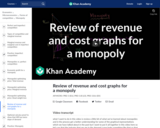
In this video, we review the key features, behavior, and consequences of a monopoly. Created by Sal Khan.
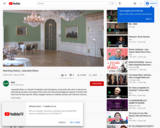
Jeannette Ehlers is a Danish-Trinidadian multi disciplinary visual artist who aims to disrupt the dominating narratives and replace them with ones that acknowledge the aspects of history that have thus far been ignored. Ehlers engages themes of visibility, identity, and collective memory, such as her work I am Queen Mary, which represents one of four queens who led the 1878 labor revolt in Saint Croix, a former Danish colony.
Presenting her works at the sixth MAD Symposium, Ehlers discusses how it is possible to reframe history so that it is inclusive to all and provides examples how to do so through her works. Ehlers engages us, urging us to see how art, and other mediums like food, can provoke, lead and guide, people to better self-understanding.
Michael Miller is the co-founder of the London and New York Meditation Center. Miller regularly teaches all across the globe, introducing the ancient technique of Vedic Meditation in a way that is accessible and relevant to people living in today's world.
Interweaving practical techniques with vocal advice, Miller compels us to see how meditation can make us more available, responsive, and active in our lives. By tuning in to, and ridding ourselves of stress we can create better kitchen environments, he argues.
About MAD:
MAD is a non-profit transforming our food system by giving chefs and restaurateurs the skills, community, time, and space to create real and sustainable change in their restaurants, their communities, and across the world.

In Reynolds v. Sims (1964) the U.S. Supreme Court ruled that states must create legislative districts that each have a substantially equal number of voters to comply with the Equal Protection Clause of the Fourteenth Amendment. It is known as the "one person, one vote" case. Justices struck down three apportionment plans for Alabama that would have given more weight to voters in rural areas than voters in cities.

In Rhode Island v. Innis (1980), the Supreme Court created the "functionally equivalent" standard for determining when police officers are interrogating a suspect. The Court ruled that an interrogation is not limited to direct questioning, but instead covers any actions that can be reasonably understood as coercive.

In order to enjoy our tradition of rights in the United States, we must also fulfill responsibilities to assure that all can benefit from the liberty and equality on which the United States was founded. Many of the rights we can exercise have concrete responsibilities of actions we must take to assure the common good. This lesson will examine the differences between rights and responsibilities, and how both relate to the concept of the common good.

The Declaration of Independence, based in part on the philosophy of John Locke, was an “expression of the American mind”. Going back to Magna Carta, British nobles had petitioned the monarch demanding limits to his power. But Locke argues and the Declaration of Independence asserts that legitimate government is based on the consent of the governed. Locke’s ideas were too democratic, too revolutionary for his time in England, but a century later they had a firm hold in the American colonies, and in 1776 they were the basis of the original and most fundamental American statement of rights, the Declaration of Independence.
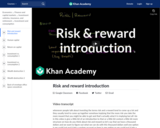
Basic introduction to risk and reward. Created by Sal Khan.
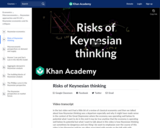
Why Keynesian thinking might not be ideal sometimes. Created by Sal Khan.
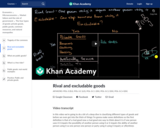
Learn the difference between rivalry and excludability, and how these characteristics determine whether a good is a private good, public good, artificially scarce good, or common resource.